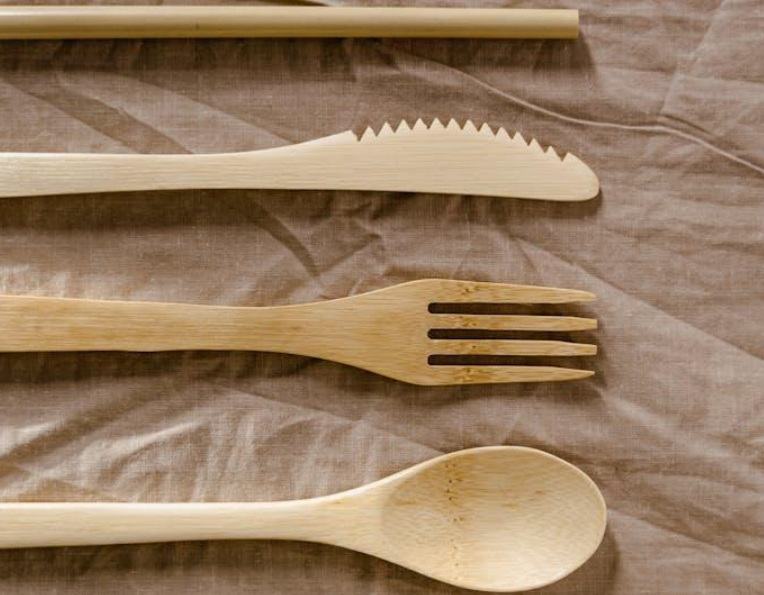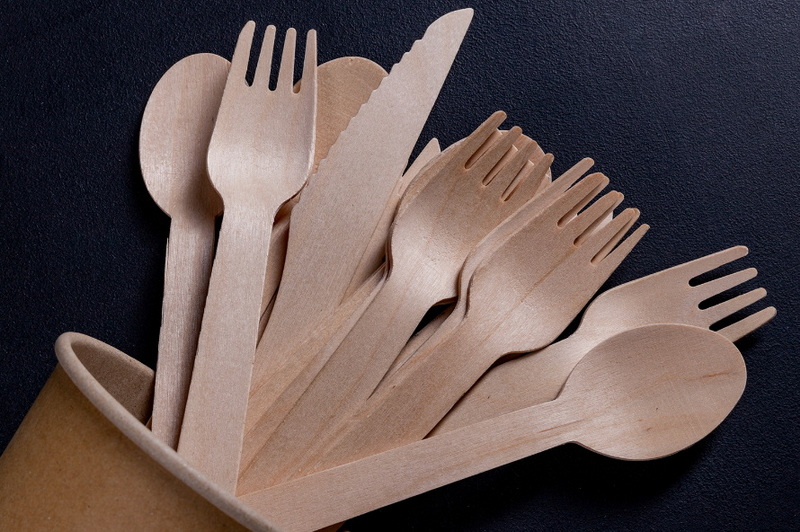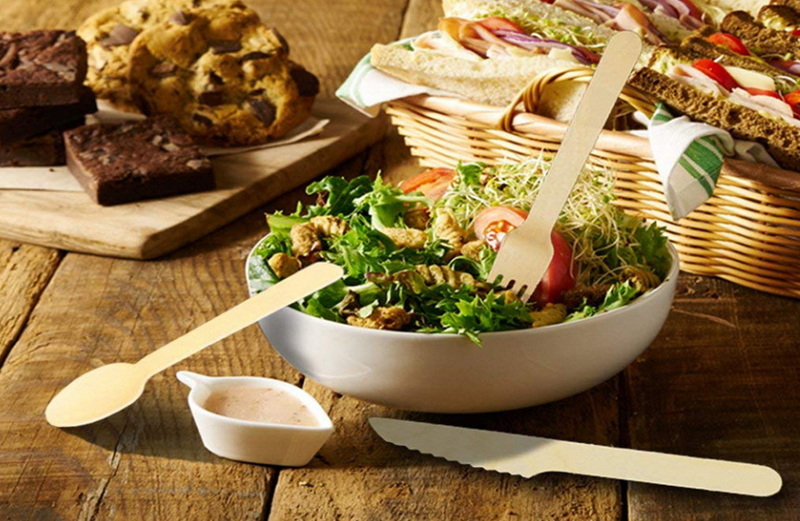
Content Menu
● Introduction to Disposable Wooden Cutlery
>> Environmental Benefits
● Health Benefits
● Practicality and Aesthetics
● Comparison with Other Materials
● Market Trends and Consumer Preferences
● Challenges and Future Developments
● Innovations in Production
● Impact on Local Economies
● Consumer Education and Awareness
● Conclusion
● FAQs
>> 1. Are Disposable Wooden Fork and Spoon Compostable?
>> 2. What Are the Health Benefits of Using Disposable Wooden Fork and Spoon?
>> 3. How Do Disposable Wooden Fork and Spoon Compare to Plastic Utensils in Terms of Environmental Impact?
>> 4. Can Disposable Wooden Fork and Spoon Be Washed and Reused?
>> 5. Are Disposable Wooden Fork and Spoon More Expensive Than Plastic Utensils?
In recent years, the world has seen a significant shift towards more sustainable and eco-friendly practices, particularly in the realm of disposable cutlery. Among the various alternatives to traditional plastic utensils, disposable wooden fork and spoon have gained considerable attention due to their numerous benefits. This article will delve into the advantages of using disposable wooden fork and spoon, exploring their environmental impact, health benefits, and practicality.

Introduction to Disposable Wooden Cutlery
Disposable wooden cutlery, including disposable wooden fork and spoon, is made from natural materials such as birch or bamboo. These materials are renewable, biodegradable, and compostable, making them an attractive option for those seeking to reduce their environmental footprint. The production process typically involves minimal processing, ensuring that the natural properties of the wood are preserved. This minimal processing also helps maintain the aesthetic appeal of the wood, which can add a rustic charm to dining experiences.
Environmental Benefits
1. Renewable Resources: Wooden cutlery is sourced from fast-growing trees like birch and bamboo. These resources are renewable and can be harvested sustainably, ensuring that their use does not lead to deforestation. Sustainable forestry practices ensure that for every tree harvested, multiple new ones are planted, maintaining a healthy ecosystem and supporting biodiversity.
2. Biodegradability and Compostability: Unlike plastic, which can take hundreds of years to decompose, disposable wooden fork and spoon break down naturally within a few months. They are also compostable, meaning they can be mixed with food waste to improve soil quality and reduce landfill waste. This reduces the amount of waste sent to landfills and minimizes the risk of plastic pollution in oceans and waterways.
3. Lower Carbon Footprint: The production of wooden cutlery requires less energy and emits fewer greenhouse gases compared to plastic. Additionally, trees absorb CO2 as they grow, further offsetting emissions. This makes wooden utensils a more environmentally friendly choice for consumers and businesses looking to reduce their carbon footprint.
Health Benefits
1. Chemical-Free: Unlike plastic utensils, which may contain harmful chemicals like BPA and phthalates, disposable wooden fork and spoon are made from natural materials that are safe for contact with food. This reduces the risk of chemical leaching into food, especially when heated or used with acidic or oily foods.
2. Antimicrobial Properties: Wood has inherent antimicrobial properties that can inhibit the growth of bacteria and other pathogens, making wooden utensils a safer choice for eating. This is particularly beneficial in settings where hygiene is paramount, such as in food service industries.
Practicality and Aesthetics
1. Aesthetic Appeal: Wooden cutlery offers a unique and natural aesthetic that can enhance dining experiences, especially in outdoor settings or events. The rustic look of wooden utensils can add a touch of elegance and sophistication to any meal.
2. Allergy-Friendly: Some individuals may have sensitivities to metals, making disposable wooden fork and spoon a comfortable alternative. This is particularly important for people with metal allergies or those who prefer to avoid metal contact with food.
3. Versatility: Wooden cutlery is suitable for a wide range of applications, from casual picnics to formal events. They are lightweight, easy to transport, and can be used with both hot and cold foods.

Comparison with Other Materials
When comparing disposable wooden fork and spoon to other materials like plastic or bioplastics, several factors stand out:
- Sustainability: Wooden cutlery is made from renewable resources and has a lower carbon footprint compared to plastic or bioplastic options. While bioplastics are often touted as a sustainable alternative, they require specific conditions to decompose and may not be as widely compostable as wooden utensils.
- Safety: Wooden utensils are free from harmful chemicals and have antimicrobial properties, making them safer for use with food. This is a significant advantage over plastic, which can leach chemicals into food under certain conditions.
- Biodegradability: Unlike even compostable plastics, which require specific conditions to break down, wooden cutlery can easily decompose in natural environments. This reduces the risk of contributing to plastic pollution and supports a circular economy.
Market Trends and Consumer Preferences
The market for disposable wooden fork and spoon is growing rapidly as consumers become more environmentally conscious. Many restaurants, cafes, and event organizers are opting for wooden cutlery to align with their sustainability goals and appeal to eco-aware customers. Additionally, governments are implementing policies to reduce plastic waste, further driving demand for sustainable alternatives like wooden utensils.
Challenges and Future Developments
Despite the benefits, there are challenges associated with the production and distribution of disposable wooden fork and spoon. These include ensuring sustainable sourcing practices, maintaining consistent quality, and managing costs to remain competitive with plastic alternatives. Future developments may involve improving manufacturing processes to increase efficiency and reduce costs, as well as expanding distribution channels to make wooden cutlery more accessible globally.
Innovations in Production
Recent innovations in production have focused on enhancing the durability and longevity of wooden utensils without compromising their biodegradability. Techniques such as applying natural oils or waxes can improve the resistance of wood to moisture, making it more suitable for use with hot foods or in humid environments. These advancements are crucial for increasing consumer confidence in the performance of wooden cutlery.
Impact on Local Economies
The shift towards disposable wooden fork and spoon can also have a positive impact on local economies. By supporting sustainable forestry practices, communities can benefit from job creation and economic growth in the forestry and manufacturing sectors. Additionally, local businesses can capitalize on the trend by offering eco-friendly products that appeal to environmentally conscious consumers.
Consumer Education and Awareness
Educating consumers about the benefits of disposable wooden fork and spoon is crucial for driving demand and promoting sustainable practices. Campaigns and initiatives aimed at raising awareness about the environmental and health benefits of wooden cutlery can encourage more people to make the switch from plastic. This can be achieved through social media campaigns, partnerships with eco-conscious brands, and educational programs in schools and communities.
Conclusion
In conclusion, disposable wooden fork and spoon offer a sustainable, safe, and practical alternative to traditional plastic cutlery. Their environmental benefits, health advantages, and aesthetic appeal make them an excellent choice for consumers and businesses alike. As the world continues to seek more eco-friendly solutions, the adoption of disposable wooden fork and spoon can contribute significantly to reducing plastic waste and promoting sustainable practices.

FAQs
1. Are Disposable Wooden Fork and Spoon Compostable?
Yes, disposable wooden fork and spoon are compostable. They can be composted in both home and commercial composting facilities, breaking down into natural materials like carbon dioxide, water, and biomass.
2. What Are the Health Benefits of Using Disposable Wooden Fork and Spoon?
The health benefits include being free from harmful chemicals like BPA and phthalates, and having antimicrobial properties that inhibit bacterial growth.
3. How Do Disposable Wooden Fork and Spoon Compare to Plastic Utensils in Terms of Environmental Impact?
Disposable wooden fork and spoon have a lower carbon footprint, are biodegradable, and are made from renewable resources, unlike plastic which relies on fossil fuels and takes hundreds of years to decompose.
4. Can Disposable Wooden Fork and Spoon Be Washed and Reused?
No, disposable wooden fork and spoon are designed for single use only and are not recommended for washing and reuse. This is to ensure safety and prevent potential bacterial contamination.
5. Are Disposable Wooden Fork and Spoon More Expensive Than Plastic Utensils?
The cost of disposable wooden fork and spoon can vary depending on the supplier and location. However, their environmental and health benefits often justify the potential additional cost for many consumers.

















